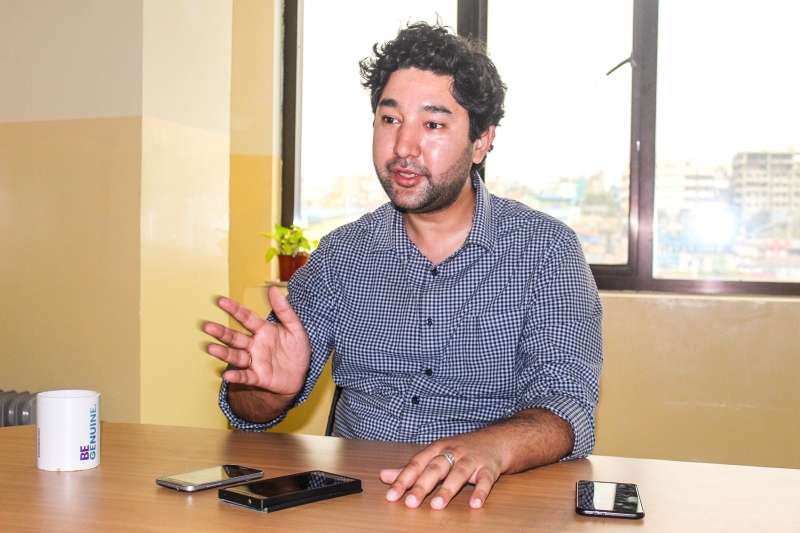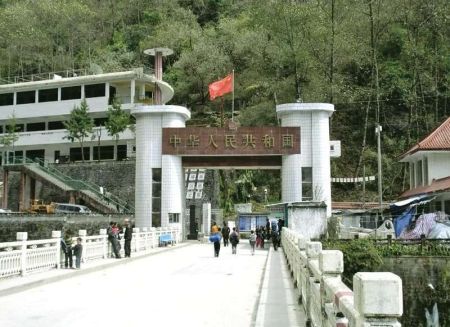At a time when most of the businesses in Nepal have been forced to deal with the strong headwinds created by the Covid-19 pandemic, the lockdown actually has turned out to be a watershed moment for e-commerce to grow in prominence. The home-grown e-commerce platform Sastodeal did not waste time to cash in on the opportunities and focused on the delivery of essential goods, kitchen appliances and other items taking the company’s business to new heights. The company, which was established in 2011, recently raised an investment of USD one million from the Dolma Impact Fund which it plans to spend in increasing market penetration across the country. Nikeeta Gautam of New Business Age talked to Amun Thapa, founder and CEO of Sastodeal about the company’s new approaches, necessity of e-commerce law, market competition, and other various issues. Excerpts:
As one of the oldest e-commerce portals in Nepal, how would you review the evolution of the online market place in Nepal and that of Sasto Deal?
Before Sastodeal, there were other ecommerce portals such as thamel.com and muncha.com. But, they were catering to the audience outside Nepal. Unlike those portals, we focused on the local market and local consumers. In that sense, we can say we're the first local e-commerce portalof Nepal. We invested here, and helped grow the e-commerce ecosystem in the country. When we started our business, internet penetration in Nepal was just 9 percent. As internet penetration grew, it created business opportunities for platforms like us.
As of now, Sastodeal’s market penetration is 70 percent inside the Kathmandu valley and 30 percent outside the valley. While this indicates a huge potential to grow outside Kathmandu, it also shows a huge digital divide. Our objective now is to bridge this digital gap.
Given the expansion of mobile telephony and availability of smartphones, we believe rural customers can also take advantage of e-commerce, and as a digital marketplace, we can reach the village areas across the country. Also, as a Nepali company, we would like to know and experience the specialty of various districts of Nepal. For example, if we want to buy pure Dhaka fabric from Palpa, we need to order it from someone who stays there or who is visiting Palpa. Hence, Sasto Deal through its ‘Nepal Special Project' is working to connect buyers and sellers, enabling people from Kathmandu to purchase Palpali Dhaka. We want to link every district through our portals. Our objective is to promote Nepali products nationally as well as internationally.
How has the journey been for Sasto Deal till now?
We started as a small company in the beginning. I was satisfied with the company which had a limited business during 2011 to 2015. However, post 2015 Earthquake, I started observing that ecommerce was expanding. This prompted us to expand our business and in 2016, we looked for new investment. The investment came from Tele Ventures, a local investment firm. Recently, we had a second round of investment in our company through Dolma Impact Fund.
I was fortunate enough that I did not try for investment during 2012/13. Had I get the investment back then, I would not have been able to make use of it properly. Being a first generation entrepreneur, I was not mature enough to understand the business metrics. Now, after almost 10 years of running the business, I know why Sastodeal needs new investments and I am confident enough to use the new funding in the right areas.
With new funding, Sastodeal has aimed to meet its milestone target of Rs 1 billion in revenue. What strategies are you planning to employ to meet this ambitious target?
We are now targeting the entire Nepal as our market, not just Kathmandu. We have a presence in all major cities of the country; our plan is to increase market penetration outside the capital valley. At the same time, we want our customers know the special products of the country through our Nepal Special Project and order them. We are also facilitating vendors from all around the country.
We are also collaborating with the government-owned Food Management and Trading Company (FMTC) to deliver essential items. The FMTC has partnered with us because we have expertise in logistics, delivery, payment and door-to-door services to customers. The partnership is becoming successful as we are now getting orders also from outside Kathmandu. This collaboration with the FMTC is also helping us to know our customers outside the valley and vice-versa. Here, our goal is to ensure that rural customers also get the subsidised essential items that FMTC is offering.
What are the priority areas for Sastodeal to spend the USD 1 million investment that it recently received from Dolma Impact Fund?
We are trying to improve our product delivery cycle. Our aim is to deliver orders the next day throughout Nepal. For this to happen, we are planning three different operation strategies for three geographical regions.
The other areas where Sastodeal will be investing are strengthening human resources and technology. As an e-commerce platform, we know investment in technology is a must for continuous innovation. Hence, our priority will be on research and development (R&D) also.
How are Nepali consumers evolving in terms of adopting online shopping? And, how has Covid-19 pandemic changed the paradigm?
E-commerce is one of the fastest growing retail sectors in Nepal. Multiple factors, from increased internet penetration, availability of budget smartphones, affordable data services of telecom companies to Indian influence, have contributed to the growth of ecommerce culture in the country.
The Covid-19 pandemic brought the new age group i.e. middle-aged people towards online shopping. Before Covid-19 pandemic, most of our customers were the youth. The lockdown has forced them (middle-aged group) to learn digital tools including online shopping. This has effectively increased the customer base for online business platforms.As people were forced to stay inside their homes, many now have knowledge to use e-commerce sites and apps.
Now, we are getting lot of orders for FMCG products, vegetables, frozen food, baby items and home appliances. These orders have been placed by people who are over 40 years of age. Immediately after the lockdown, we received huge orders for delivery of LPG cylinders as there was a cooking gas shortage in the market. During this period, we also sold thousands of induction cooktops. This shows an acceptance for online shopping from the middle-aged group who have entered the e-commerce space.
Mature online payment system, proper numbering of houses and naming of streets are critical components for the development of the e-commerce ecosystem. What is the situation like in Nepal?
In countries with a developed e-commerce ecosystem, payments are done in advance digitally whereas cash-on-delivery is the most preferred mode of payment. Similarly, finding landmarks and delivery points is difficult for delivery persons as streets and houses haven’t been properly named and numbered. Here, the easiest and common landmarks to find locations for delivery are the temples.
As delivery persons cannot reach exact locations, they have to make calls repeatedly and spend time finding out the direction. Hence, a product which could be delivered in half an hour will take an extra half an hour due to these limitations. However, our company has reached this stage by resolving these issues.
The government is said to be preparing a draft of an e-commerce law. Have people from the e-commerce business been approached by the Ministry of Industry for this?
Lately, the government has been very supportive as the ministry has been in constant touch with us. The law, which is being drafted under the leadership of Commerce Secretary Baikuntha Aryal, is important for the development of the e-commerce sector in Nepal. We are one of the few countries having a National Ecommerce Strategy which has already been endorsed by the cabinet.The problem here is, more than 50,000 e-commerce portals are operating illegally across the country, giving a wrong name to this industry. As many of these websites have been found cheating customers, the reliability of online shopping has been questioned. This has created a big challenge for players like us.
Companies like ours have been properly registered at tax authorities and our business records have been well assessed from every angle. Given our decade-long experience, we know how to make things work in e-commerce. Our vendor selection is also strong. But many e-commerce sites do not follow these best practices. Once the law comes into force, we believe there will be filtration in the business. Issues such as protecting customers' data, accountability in case of defective product and other legal matters would be addressed once the law is implemented.
What arrangements have you sought in the e-commerce law?
First, I think there should be a separate definition for different e-commerce platforms. As the Nepali e-commerce sector is evolving, we can see the development of marketplaces such as B2C (business to customer), B2B (business to business) and C2C (customer to customer). For instance, hamrobazaar.com is a C2C site where one customer sells a product to another customer. If the buyer does not pay, then hamrobazaar is not responsible. But people do not understand this nuance. I remember this website was closed for a short time due to such controversies a few years ago. Hence, the law should define different types of e-commerce platforms separately and treat them accordingly.
Second, the law should be drafted in consultation with all stakeholders. My point is there should be discussion not only with e-commerce players, but other government and state bodies such as the Department of Commerce, Nepal Rastra Bank, among others who also are critical actors of the e-commerce ecosystem. A broader consultation is also necessary to avoid misunderstandings in the future. While doing so, we should not ignore the consumers, who are the drivers of the business.
How has competition for Sastodeal been like at a time when online shopping platforms are mushrooming across the country?
Currently, the penetration of e-commerce in the country's retail business sector is less than 2 percent. Hence, our competition is with the offline marketplace. It has been estimated that the penetration of the online marketplace will grow to 20 percent by 2025 and we are also working to contribute towards achieving that target.
E-commerce is a very sensitive industry where reviews of products and services are public. We receive direct feedback from customers quickly and all the data is well kept.
I see regular comments about online shopping experience in various Facebook pages. However, in Nepal, it has been seen that people generally prefer to review products and services only when they encounter a bad experience. If we see in India and other countries, customer feedback is both good and bad. We must develop the culture of feedback which will help us grow holistically over the years.
Currently, we are competing with the company owned by the Chinese e-commerce giant Alibaba Group.
Actually, this competition has been very fortunate for us. When they entered the market, we were concerned about our survival. But the fact that we're competing with an entity of the world's leading e-commerce company motivated us to grow and survive. Customers and clients started comparing our website and features with theirs. Hence, there was pressure to make ourselves better and smarter.
What are the new strategies that e-commerce platforms in Nepal have to follow to develop the e-commerce scene as well as create healthy competition in the market?
There will be a lot of growth in the e-commerce industry in the next few years, but the infrastructure is necessary for that growth. Policy must be key because, presently, there is confusion and mistrust in the market due to lack of a legal framework. For example, people have just started using digital wallets. So, when the synergy between digital wallets and e-commerce increases, the refund policy will also be quick. After that, refunds will be done in 24 hours and exchange will be done in seven days. With the addressing of such issues including refund policy and accountability of the e-commerce company, people will be more confident regarding online transactions.
Nepal’s e-commerce sector is said to be booming amid the COVID-19 crisis which has spelt disaster for most businesses from different verticals. How have the last four months been like for Sastodeal in terms of growth and expansion?
We have registered a 300 percent growth this year. According to our study, there have been a few changes after the start of the Covid-19 crisis. Before, people mostly used to order high-ticket items such as refrigerators, TVs, vacuum cleaners etc., through e-commerce platforms. Now people have started looking for low-ticket items such as phone accessories, chargers, keyboards, etc. So, people have shifted towards necessity items.
Secondly, another big change is that people are using digital wallets. During the time of the lockdown, 80 percent of people were using digital wallets and scan pay, but now people have started dealing in cash again. So, I think it’s high time that wallet companies become aggressive in the market. While many companies are struggling to survive in the market now, I think now is the time for e-commerce, wallet and IT-based companies to be aggressive and serve the market.
As a company, what major strengths has Sastodeal gained and what weaknesses has it struggled with over these years?
Sastodeal has played a huge role in establishing e-commerce in Nepal. It has influenced many people to enter the area of electronic retail. Also, in these nine years, we faced a lot of financial stress and overcame it as a team.
The challenge in Nepal is we see it as a small market, and there is a bigger challenge to bring investment. As an investor, if someone does not have an understanding of the industry, they won’t invest. So, by changing that mindset of investors, we have been able to bring big investments for Nepal. I consider this as a big accomplishment to win investors’ trust and make them invest in e-commerce.
Likewise, we have been able to partner with the government. This is also a milestone for us since we are the first e-commerce platform to partner with the government. Five years ago, we could only deliver in Kathmandu and Pokhara. Now, we have been able make deliveries in all the major cities of Nepal within three days of receiving orders.
In terms of technology as well, we have managed to come up with a world-class technology that the vendors are using. It’s a complex system that we have for the vendors. And slowly, we are building that for customers as well. All these are accomplishments and this is an ongoing process for us.
Also, as e-commerce is comparatively new, we do lots of trial and error. Our biggest disadvantage is that our competitor has global knowledge. They get information from China, Pakistan, and Bangladesh. They are associated with the pioneering e-commerce company in Asia. But we have to learn that ourselves. So that’s a challenge that we have.
How many people are working at Sastodeal currently? How is people management in your company?
Sastodeal has 100 employees. Their contribution is very high because we don’t have experts in the Nepali e-commerce sphere. Employees join our office, get trained, work and learn more. Recognising the efforts of staff, Sastodeal has introduced the Employee Stock Ownership Plan (ESOP). We are probably the first and only company in Nepal which has this type of programme. The median age of staff in our company is 26 years. We felt that people are giving the company the prime time of their lives and that they should not just get the salary as a return. There are metrics of less or more depending on the number of years and the position they hold. But, everyone working in Sastodeal is eligible to receive the company’s stock after they spend three years with us.
Apart from this, we also have paid menstrual leave. We allow women staff to take a two-day leave in a month to make them comfortable. We also have paid community leave where any staff can take up to three days of leave to serve the community. Suppose, if someone wants to invest their time on distributing relief during natural calamities or helping low-income families, they can apply for the leave. But they have to present their experience to their team after coming back. There is no definite corporate social responsibility (CSR) programme at Sastodeal, but these are our ways of serving the community. We believe CSR has to be inbuilt as part of the company’s policy.






















